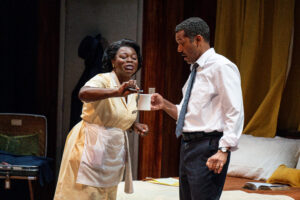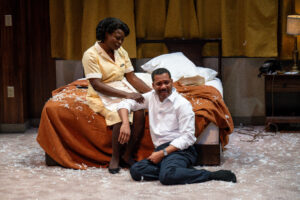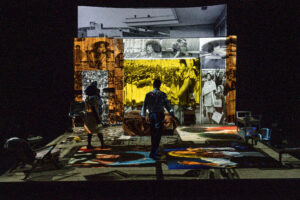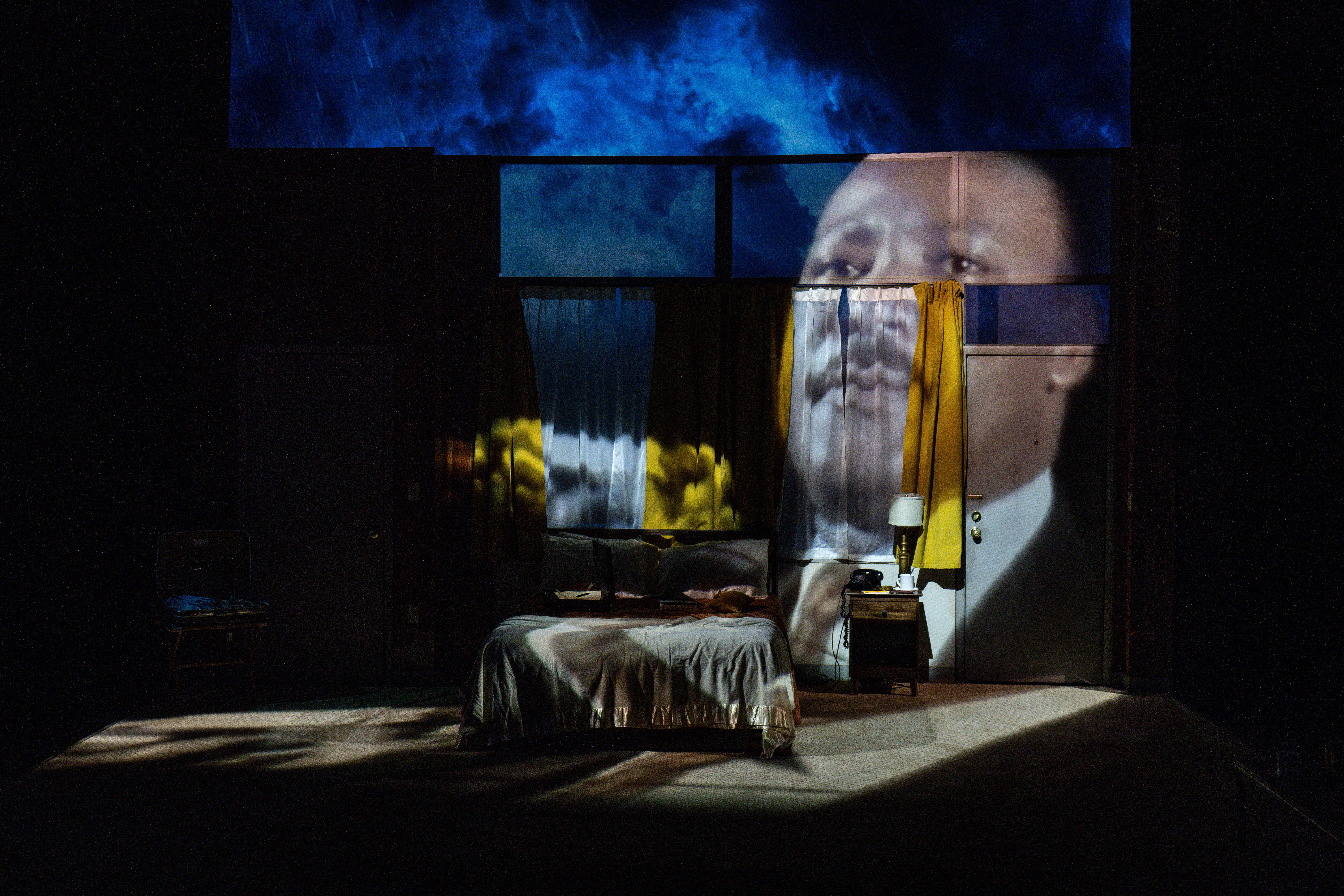CEDAR CITY — Can a hero ever live up to all we expect them to be? I thought this was going to be the major dramatic question of the Utah Shakespeare Festival production of The Mountaintop by Katori Hall. The play takes place on the eve of Dr. Martin Luther King Jr.’s assassination in Memphis and is a two person show. The only two characters are Dr. King, played by Abdul-Khaliq Murtadha and Camae played by Alia Shakira, and the two of them have an evolving relationship dynamic that serves as a many-faceted exploration of the face of a movement just before his martyrdom.
At the start of the show, a late night thunderstorm is rattling the small hotel room set on the Anes Studio Theatre stage. Perhaps more than the walls themselves, each clap of thunder rattles Dr. King who has just delivered his seminal address titled “The Mountaintop” to workers in Memphis. He is anxiously awaiting another cigarette and preparing for his next speech that will ultimately never be delivered. Through the night, Dr. King begins to made unabashed advances on Camae, the hotel staff member who has come to bring him coffee and lend him an ear. A radical shift occurs when Dr. King, comes to discover that Camae is more than she appears, and has come to tell him that his death approaches. The rest of the action follows Dr. King’s struggle with the thought that his last day has approached and the baton may not carry on without him.

Murtadha faces a difficult task in playing an iconic real person known for his unique vocal timbre and cadence. Dr. King is spoken of in often reverential tones, but the play’s text takes a historiographical approach to the man and explores his flaws and real world context. From the outset, Murtadha is methodical in his approach to Dr. King’s routines. Murtadha enters the space without much spoken dialogue, and takes his time simply acclimating to the hotel room space. He paces the room, draws the blinds, and begins working on a speech with a legal pad and pen. From there, he takes a leisurely trip to the bathroom, calls for room service, and is visibly bothered when thunder rolls. It is this approach to truly embodying the man that makes Murtadha such a fascinating actor to watch in the role. He is able to easily slip from devoted husband and father on the phone to libido driven charmer in the same moments. He approaches the speech preparation with mighty, focused zeal but brings a genuine unbridled aggression and paranoia to the moments in the play that call for it. He does so while bringing out the essence of the known man without slipping into a caricature of the folk hero whose words have boomed across America for decades. Murtadha’s performance as Dr. King is nuanced and unorthodox while remaining respectful and true to what gave Dr. King such gravity as a person in his lifetime.
Shakira’s role as Camae is similarly deep. The first half of the play’s action sees her as a rangy and somewhat smitten member of the hotel staff who knows she’s long extended her intended action, but enjoys that she hasn’t overstated her welcome. Camae spends much of the play’s first half torn between staying or going. In the moments she wants to be in the room, Shakira leaps on the bed as a rebellious and victorious visionary and shouts her message in full voice. She also finds little moments to busy herself around the space and continuously makes excuses to exit while not fully doing so. Shakira as this star struck bumpkin is believable and leads to an even more interesting transformation when she becomes the ethereal, though still magnetic, messenger from God. The later Camae leads Dr. King through an exploration of what God’s purpose in allowing Dr. King to end his work on Earth is about. Shakira is an active listener, and assumes the mantle of power figure in the play’s second half as the narrative switches to understanding how leaders pass on.

The play doesn’t intend for audience members to simply observe. Two of the most powerful sequences come in the play’s final moments. Dr. King begs to see a vision of the future, and a powerful spoken word poem that starts with Shakira on stage and becomes an immersive part of the audiovisual topography. Projection and Sound designers Joe Payne and Ien Denio wove a masterful and thought provoking vision of Black narratives and cultural events from 1963 to 2024 together in a way that disrupts the audience from disengaging.
The second of these moments was Murtadha’s final speech. The house lights were brought up, and the actor faces the audience pleading with them to carry the baton of civil rights advocacy beyond what they have seen that day. It is a call to action worthy of Berthold Brecht and is the culmination of a 110 minute exploration of the character of a man woven deeply into the fabric of 20th century America.

On balance, the play was raw and emotional. Aggressive profanity and use of racial slurs was interspersed in the play, and there was a terrifying sequence when Dr. King loses control and begins to attack Camae in an act of uninhibited paranoia. The play’s overall themes and messages are mature, and it is a show that takes a higher than average level of understanding to totally unpack. However the benefit of doing so is immense. The play’s major dramatic question is not about heroes measuring up as I thought it might be. The Mountaintop instead asks the question, “How does one grapple with the legacy of incomplete things?” Dr. King’s work wasn’t finished in his lifetime, and his knowledge of that, having died at just 39 years old, drives the story forward.
The play’s two actors were masterful in their evolution through the play, and the play’s conclusion was a powerful call for social justice. Like a decadent dessert, at times the play suffers from having a little too much of a good thing. It’s hard to take in all of the story at once, but the intimate nature of the play is well served by the close proximity of audience and actors who feel connected through an event that rocked the country and has impacted the nation for generations. Utah Shakespeare Festival has taken a bold creative step in producing The Mountaintop by asking audiences to continue to engage in the kinds of conversations that have made Festival patrons return for decades.
[box]The Mountaintop plays through October 5 in the Eileen and Allen Anes Studio Theatre (101-199 University Blvd, Cedar City). Tickets are $50-60. For more information, visit bard.org.[/box]
